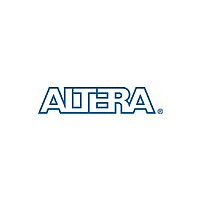EP3C16F256I7N Altera, EP3C16F256I7N Datasheet - Page 228

EP3C16F256I7N
Manufacturer Part Number
EP3C16F256I7N
Description
Cyclone III
Manufacturer
Altera
Available stocks
Company
Part Number
Manufacturer
Quantity
Price
Company:
Part Number:
EP3C16F256I7N
Manufacturer:
IR
Quantity:
14 520
Company:
Part Number:
EP3C16F256I7N
Manufacturer:
ALTERA31
Quantity:
214
Part Number:
EP3C16F256I7N
Manufacturer:
ALTERA/阿尔特拉
Quantity:
20 000
- Current page: 228 of 582
- Download datasheet (7Mb)
External Memory Interfaces in Cyclone III Devices
9–14
Cyclone III Device Handbook, Volume 1
The data mask (DM) pins are only required when writing to DDR2 and
DDR SDRAM devices. QDRII SRAM devices use the BWS# signal to select
the byte to be written into memory. A low signal on the DM or BWS# pin
indicates the write is valid. Driving the DM or BWS# pin high causes the
memory to mask the DQ signals. Each group of DQS and DQ signals has
one DM pin. Similar to the DQ output signals, the DM signals are clocked by
the –90° shifted clock.
In Cyclone III devices, the DM pins are preassigned in the device pinouts.
The Quartus II fitter treats the DQ and DM pins in a DQS group equally for
placement purposes. The preassigned DQ and DM pins are the preferred
pins to use.
Some DDR2 SDRAM and DDR SDRAM devices support error correction
coding (ECC), a method of detecting and automatically correcting errors
in data transmission. In 72-bit DDR2 or DDR SDRAM, there are eight
ECC pins and 64 data pins. Connect the DDR2 and DDR SDRAM ECC
pins to a DQS/DQ group in Cyclone III devices. The memory controller
needs additional logic to encode and decode the ECC data.
Address and Control/Command Pins
The address signals and the control or command signals are typically sent
at a single data rate. You can use any of the user I/O pins on all I/O banks
of Cyclone III devices to generate the address and control or command
signals to the memory device.
1
Memory Clock Pins
In DDR2 and DDR SDRAM memory interfaces, the memory clock signals
(CK and CK#) are used to capture the address signals and the control or
command signals. Similarly, QDRII SRAM devices use the write clocks (K
and K#) to capture the address and command signals. The CK/CK# and
K/K# signals are generated to mimic the write-data strobe using the
DDIO registers in Cyclone III devices. You can use any regular adjacent
I/O pins to generate the CK/CK# for DDR2 and DDR SDRAM interface
or K/K# for QDRII SRAM.
Cyclone III devices do not support QDRII SRAM in the burst
length of two.
Altera Corporation-Preliminary
March 2007
Related parts for EP3C16F256I7N
Image
Part Number
Description
Manufacturer
Datasheet
Request
R

Part Number:
Description:
CYCLONE II STARTER KIT EP2C20N
Manufacturer:
Altera
Datasheet:

Part Number:
Description:
CPLD, EP610 Family, ECMOS Process, 300 Gates, 16 Macro Cells, 16 Reg., 16 User I/Os, 5V Supply, 35 Speed Grade, 24DIP
Manufacturer:
Altera Corporation
Datasheet:

Part Number:
Description:
CPLD, EP610 Family, ECMOS Process, 300 Gates, 16 Macro Cells, 16 Reg., 16 User I/Os, 5V Supply, 15 Speed Grade, 24DIP
Manufacturer:
Altera Corporation
Datasheet:

Part Number:
Description:
Manufacturer:
Altera Corporation
Datasheet:

Part Number:
Description:
CPLD, EP610 Family, ECMOS Process, 300 Gates, 16 Macro Cells, 16 Reg., 16 User I/Os, 5V Supply, 30 Speed Grade, 24DIP
Manufacturer:
Altera Corporation
Datasheet:

Part Number:
Description:
High-performance, low-power erasable programmable logic devices with 8 macrocells, 10ns
Manufacturer:
Altera Corporation
Datasheet:

Part Number:
Description:
High-performance, low-power erasable programmable logic devices with 8 macrocells, 7ns
Manufacturer:
Altera Corporation
Datasheet:

Part Number:
Description:
Classic EPLD
Manufacturer:
Altera Corporation
Datasheet:

Part Number:
Description:
High-performance, low-power erasable programmable logic devices with 8 macrocells, 10ns
Manufacturer:
Altera Corporation
Datasheet:

Part Number:
Description:
Manufacturer:
Altera Corporation
Datasheet:

Part Number:
Description:
Manufacturer:
Altera Corporation
Datasheet:

Part Number:
Description:
Manufacturer:
Altera Corporation
Datasheet:

Part Number:
Description:
CPLD, EP610 Family, ECMOS Process, 300 Gates, 16 Macro Cells, 16 Reg., 16 User I/Os, 5V Supply, 25 Speed Grade, 24DIP
Manufacturer:
Altera Corporation
Datasheet:












